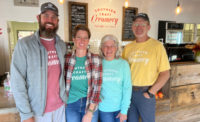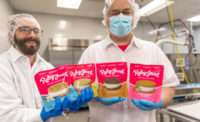Private label/co-packing products are so popular they have generated attention from the biggest retailers like Target and Amazon, and brought in new players like Gopuff, which reportedly raised more than $3.5 billion to enter the space.
Looking at the entire private brand industry, a recently released report from French-based ReportLinker stated that the private-label food and beverages market is poised to grow to $281.15 billion during the 2023 to 2027 period, accelerating at a compound annual growth rate (CAGR) of 6.39% globally through 2027.
According to Chicago-based Information Resources Inc. (IRI) data, for the 52-week period ending Dec. 9, 2022, overall private-brand dairy sales reached nearly $30 billion in U.S. multi-outlets and convenience stores, expanding at an 18% clip year over year (YoY).
Dairy is a major component of this overall tally, with private-label refrigerated white milk accounting for $8.6 billion during IRI’s defined 52-week period. Natural cheese placed a close second at $8.1 billion, while butter/butter mixes and creams/creamers both achieved more than $1 billion in private-label sales. Packaged ice cream novelties and fluid milk products both placed in the top 15 fastest-growing private-label products, NielsenIQ data reveals.
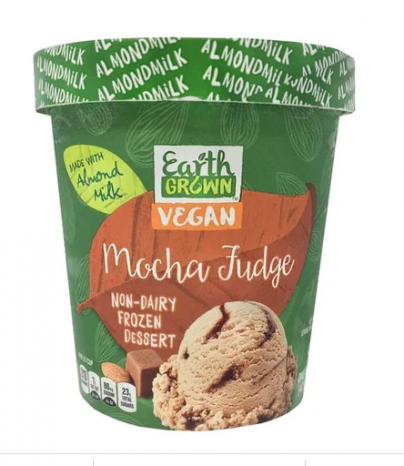
However, MaryEllen Lynch, principal of Center Store Solutions at IRI, cautions that growth in dairy milk is driven by price inflation, private label included. “In the most recent 52 weeks, consumer volume demand for dairy milk actually experienced slight declines for both branded and private label (less of a decline for private label),” she explains. “This is consistent with the overall change seen in consumer behavior across the store this past year whereby consumers were spending more, yet buying less.”
According to Alexandria, Va.-based NACS, the National Association for Convenience Stores, 7-Eleven data reveals eight out of 10 consumers buy private brands to save money, with the growth led by millennials, who have “a particular affinity for the value and quality that the brands offer.”
NACS’ State of the Industry data reports that private-label sales climbed 17.8% YoY in the convenenience channel in 2021. Strong private-label growth is evident in most demographics, with the exception of Generation Z, who are seeking new, unique and different products, 2022 NACS Convenience Voices research concluded.
“The year 2021 was the first full year in which the effects of the pandemic influenced our industry’s sales. The challenges with supply-chain disruptions led retailers to try new options with familiar/favorite branded items,” Jeff Lenard, vice president, Strategic Industry Initiatives at NACS, tells Dairy Foods. “This created some strong synergies for our industry to truly have offerings that were relevant to the needs of shoppers during a period of overall supply and economic disruption. We will have a much clearer idea if this was a temporary fad or a longer-term trend once we analyze the numbers from 2022 over the next few months.”
Many convenience stores have a dairy heritage, and those are among the companies who have seen the most success with private-label milk, Lenard adds. Two companies of particular note are Powell, Tenn.-based Weigel’s, which celebrates its creative flavored milk limited-time offers, which have included Orange Creamsicle, Peanut Butter Chocolate, Pecan Pie and Birthday Cake.
“Kwik Trip (La Crosse, Wis.) focuses on take-home items as much as it does the traditional immediate consumption items. With a greater focus on grocery items, its milk sales also have grown as part of that market basket,” Lenard explains. “Another unique element to Kwik Trip’s offer is that it sells bagged milk, which is competitively priced based on the lower costs of shipping and production. And, yes, they provide free pitchers to serve the milk if customers need one.”
Value proposition
If the pandemic taught us one thing, it’s you never know what the future has in store, Peggy Davies, president of the Private Label Manufacturers Association (PLMA), tells Dairy Foods. “However, I do believe that, while it’s not a trend, quality will continue to be the mantra in the coming year. Quality and innovation are driving the industry. Consumers want value, however, not at the expense of a quality product. Retailers’ own brands are reflecting those consumer demands. In fact, based on the data from IRI, PLMA is projecting the 2022 sales of store brands to reach $221 billion. That’s a $21 billion increase over 2021 and a new annual record.”
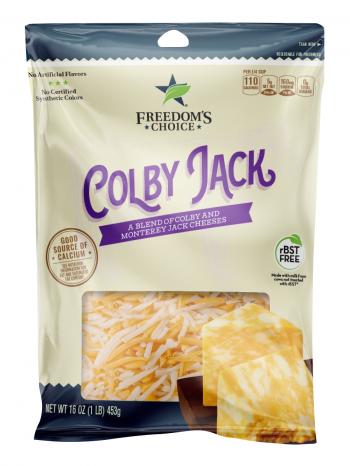
Private-label dairy products have and should continue to be a main component of this growth, Davies says. In November, the trade group honored several dairy products with 2022 Salute to Excellent awards. Among the winners were: Freedom’s Choice Shredded Colby Jack Cheese; Hannaford Strawberry Cheese Cake ice cream; Wide Awake Sweet Cream Real Dairy coffee creamer; ALDI Low Sugar Plain Greek yogurt; Earth Grown Non-Dairy Mocha Fudge Almond Milk pint; and the Culinaria Hibiscus Lime Craft Tea four-pack.
Anecdotally, the affinity for private label also seems warranted, as continued high inflation has continued to put a strain on consumers’ wallets. In fact, “Consumer Inflation Sentiment: Inflation Slowly Ebbs, but Consumer Outlook Remains Gloomy,” compiled by PYMNTS, reports that 37% of the 2,100 U.S. consumers it surveyed reported reducing the quality of items they buy at the grocery store in response to rising prices.
One company capitalizing on the trend is The Kroger Co., which has gone all in on private-label products. It continues to grow its Our Brands product line with the expansion of its Simple Truth plant-based line and seasonal fresh favorites.
“We are applying technology and innovation to improve freshness, grow Our Brands, and create a seamless shopping experience so our customers can get what they want, when and how they want it, with zero compromise on quality, selection and affordability,” CEO Rodney McMullen said during the company’s September earnings conference call.
In October, the Cincinnati-based retailer launched the Our Brands Innovation Summit, a program to enhance and accelerate the selection of private brand items sold across Kroger locations.
“At Kroger, we’re constantly innovating, studying customer data and working to stay ahead of trends so we can provide customers with the highest quality products they’re looking for at affordable prices,” says Juan De Paoli, Kroger’s vice president of Our Brands. “By inviting private-brand suppliers to apply for this opportunity, we’re confident we will find fresh ideas and innovative products to expand our portfolio of offerings and support the growth of new businesses we bring into our supplier network.”
Walmart has also seen exceptional growth in private-label sales. “In food categories, specifically, the private brand growth rate doubled compared to Q1 levels,” John David Rainey, chief financial officer, stated during an earnings conference call in August.
Did the pandemic change the game?
In the early weeks of the pandemic, private brands were expected to surge as shelter-in-place consumers looked for ways to save money. This is not what happened, however.
In 2020, for the first time in a decade, sales growth of national brands outpaced the growth of private brands. Many national brands postponed development or launches of new items and stuck with core staple items to keep in stock during those pantry filling days.
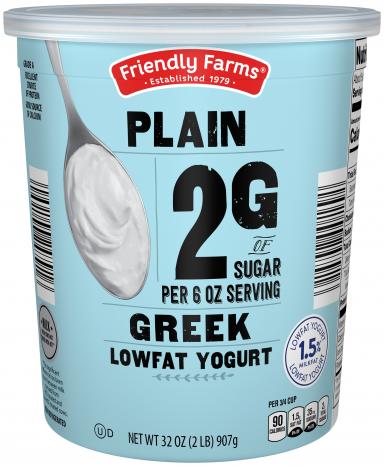
“Supply chain issues, labor shortages in distribution and national brands foregoing co-pack arrangements to keep their brands in stock were all contributing factors. Further, with business travel and commuting down, consumers had more disposable income and were not looking for value,” Jim Dimataris, vice president of Processor Partnerships for the California Milk Advisory Board, Tracy, Calif., reveals.
Conversely, during this same period, national brands were also experiencing supply issues, forcing pantry fillers to buy private brands. “This was in many ways the best sampling opportunity in decades as many consumers found the quality was meeting their expectations. This dynamic combined with spiraling inflation and fuel prices has fostered this newfound consumer trust in private brands growth and resulting gains in share,” he continues.
Beyond that, national brand price increases have outpaced private brand increases as co-packers often have negotiated limitations and partnering agreements. This trend is expected to continue at least until inflation gets under control, which does not appear to be anytime soon, Dimataris adds.
COVID-19 accelerated all sales across the store due to unprecedented demand for milk, Jason Lee, chief customer officer for Boulder, Colo.-based Aurora Organic Dairy (AOD), notes. “The great news is that our business has continued to grow post pandemic. Consumers continue to look for high quality private-label products that are a value to the national brands. Based on current inflationary conditions, we feel confident that consumers will continue to seek private-label dairy.”
IRI tells Dairy Foods some retailers are making a commitment by investing in developing their store brands as “brands.” This includes marketing support and also communication with their shoppers to build trust and inspire trial.
“Having a quality product aligned to target consumers’ expectations, and achieving consumer trial for that product underlies trust. Within commodity categories, private label has more credibility than in other less commoditized categories. Milk, butter and cheese are three categories where private label is seen as a quality alternative to brands. We do see private label outpacing brands in 12 of the Dairy15 categories. This is a shift from 2021, where brands were growing faster in 11 of Dairy15 categories,” Lynch relays.
2023 trends
Private label is unlikely to go out of style any time soon. Inflation and the potential for a recession are key reasons these products should remain popular. “We feel confident that the shift to private-label brands will continue well into the future, due to its high quality and better value for the consumer,” Lee maintains.
Grocery shoppers have really been through a lot the past three years, first with the uncertainty of the pandemic shut downs, then uncertainty of out-of-stocks, and then “just when they thought they were out of the woods, inflation kicked in and they saw their grocery bill go up month after month,” Lynch adds.
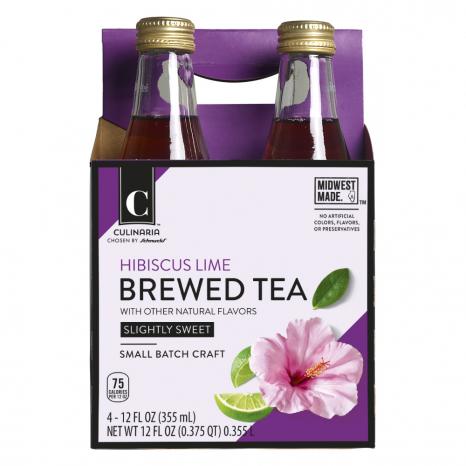
“Current shopping behaviors, including their current level of private-label purchasing, are expected to continue for the near term in 2023… even with calming inflation. The uncertainty of a recession and how consumers personally interpret that will influence their behavior as time goes on,” Lynch says.
Among the more than 30,000 store brand products on display at last year’s PLMA show, expanded and unique flavorings, healthy attributes, convenience, and pure or raw ingredients were among the most popular, Davies mentions.
“So, overall, I’d say continued quality, unique product attributes, and sustainability are some of what we think we’ll be seeing among store brand offerings in 2023,” PLMA’s president concludes.



